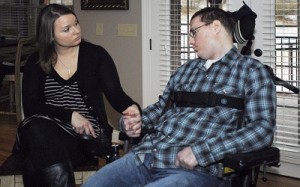Military Connection: Caregiver Support: By Debbie Gregory
 The federal government provides support to family members who care for severely injured Post-9/11 Veterans under the Caregivers and Veterans Omnibus Health Services Act of 2010. The Department of Veterans Affairs (VA) provides support through their Comprehensive Assistance for Family Caregivers program.
The federal government provides support to family members who care for severely injured Post-9/11 Veterans under the Caregivers and Veterans Omnibus Health Services Act of 2010. The Department of Veterans Affairs (VA) provides support through their Comprehensive Assistance for Family Caregivers program.
To be eligible for this VA program, Veterans must have sustained a serious injury in the line of duty, on or after September 11, 2001. These injuries include traumatic brain injury, psychological trauma, or other mental disorders. Veterans must also be in need of personal care services due to an inability to perform one or more activities of daily living, and/or need supervision or protection based on their symptoms. This could also include neurological impairment or injury. They must also be enrolled in VA health service to qualify.
It should be noted that illnesses contracted in the line of duty do not qualify a Veteran, and any Veteran with injuries that occurred in the line of duty prior to September 11, 2001 does not necessarily make a Veteran eligible.
The VA’s Comprehensive Assistance for Family Caregivers program provides a multitude of benefits and services for Veteran families that require a spouse or other family member to serve as a caregiver. These benefits include a monthly stipend, access to healthcare insurance (if needed), mental health services, VA caregiver training, respite care, and, in some cases, travel expenses that can include lodging and per diem allotments while accompanying Veterans undergoing care.
While this program is a great resource for thousands of Veteran families, it cannot meet the demand. The VA has projected that it can support no more than 4,000 caregivers through fiscal year 2015. There are currently approximately 16,000 caregivers who have been approved for the Comprehensive Assistance for Family Caregivers program.
With the program running at full capacity and only servicing 25% of those eligible, inefficiency and failures are rampant. A review of the program was recently conducted by the Government Accountability Office (GAO), and the findings were dismal.
According to the GAO review, VA facilities are ill-equipped to meet the demands, especially when it comes to providing primary care physicians and nurses. These healthcare professionals are charged with forming teams to visit the homes of applicants in order to assess healthcare needs and determine appropriate levels of caregiver support.
Officials from the VA claim that their department does not have enough staff to successfully administer the program. In many regions, there is only one VA Caregiver Support Coordinator for every 250 caregivers. Participants in the program have complained about a lack of training as to how to handle their Veteran’s needs, not being visited by medical professionals, and a multitude of unreturned phone calls.
As it is with many VA programs, the Comprehensive Assistance for Family Caregivers program is being assessed for improvement. The VA agreed with recommendations made by the GAO to fix the program so that eligible caregivers get the services they need. It is unclear, at this time, where the improvements will be made, and how long it will take to get the program on track.
Military Connection proudly serves those who serve in the Army, Navy, Air Force, Marines, Coast Guard, Guard and Reserve, Veterans and their Families. We are the go to site for Veteran Employment and information on Veteran education. Militaryconnection.com provides Veterans with and Directory of Employers, a Job Board, information on the Post-9/11 GI Bill, and a blog that offers Veterans boundless information. Be sure to visit Militaryconnection.com, the go to site.
Military Connection: Caregiver Support: By Debbie Gregory

















